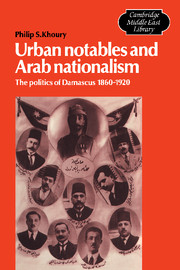Book contents
- Frontmatter
- Contents
- List of maps
- Note on transcription
- Preface
- Introduction
- 1 The political configuration of Damascus in 1860
- 2 The consolidation of leadership in Damascus after 1860
- 3 Damascus notables and the rise of Arab nationalism before World War I
- 4 Notables, nationalists and Faysal's Arab government in Damascus, 1918–20
- Conclusion
- Notes
- Bibliography
- Glossary of Arabic, Persian and Turkish terms
- Index
- Frontmatter
- Contents
- List of maps
- Note on transcription
- Preface
- Introduction
- 1 The political configuration of Damascus in 1860
- 2 The consolidation of leadership in Damascus after 1860
- 3 Damascus notables and the rise of Arab nationalism before World War I
- 4 Notables, nationalists and Faysal's Arab government in Damascus, 1918–20
- Conclusion
- Notes
- Bibliography
- Glossary of Arabic, Persian and Turkish terms
- Index
Summary
Prior to the events of 1860, the political configuration in Damascus included both a traditional sociopolitical leadership competing directly with the Ottoman central authority for control of Ottoman-imposed institutions, and disparate power groups, socially differentiated from the traditional leadership, whose power base was rooted in control of certain autonomous organizations such as local garrisons and the grain trade.
The events of 1860 gave the Ottoman government an opportunity to alter the local political configuration to facilitate its program of centralization and modernization. Already the earliest institutions established by the Tanzimat (after 1841) had begun to break down the local paramilitary power base of leaders outside the traditional leadership; these individuals and some of their followers were, at the same time, offered a new power base within the local bureaucracy. Then a decisive Ottoman intervention to check the traditional leadership's attempt to shift the local balance of power in its own favor occurred in 1860. The ‘honorable citizens’ were punished for failing to prevent or control the militant outburst of the populace and the erosion of their local power was drastically illustrated and their lack of zeal in implementing Ottoman policies severely acknowledged. The events of 1860 permitted the Ottoman government to forge a new and more useful political élite by expanding the local bureaucracy and supporting upcoming families not previously a part of the traditional leadership.
During the next fifty years the Ottoman government managed to remold the Damascus power structure in three important ways. First, with a stronger provincial administration controlled more efficiently by Istanbul, the exercise of local political power became a function of position in the bureaucracy.
- Type
- Chapter
- Information
- Urban Notables and Arab NationalismThe Politics of Damascus 1860–1920, pp. 93 - 100Publisher: Cambridge University PressPrint publication year: 1983



